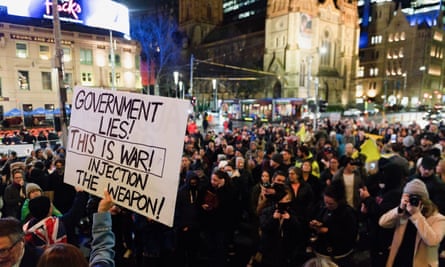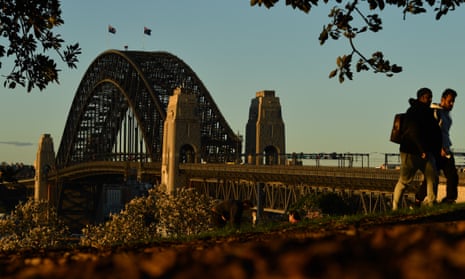The Australian state of Victoria has entered its sixth lockdown to join the country’s two other largest states under varying degrees of coronavirus restrictions as the Delta variant continues to spread.
Lockdowns have been enforced across the east coast, including Australia’s three largest cities – Sydney, Melbourne and Brisbane – putting more than 60% of the country’s 25 million population under strict stay-home orders.
Victoria, which endured one of the world’s longest lockdowns in 2020, began a snap, seven-day lockdown on Thursday in response to an outbreak of unlinked new infections.
The latest round of restrictions include rules that have become wearily familiar to Victorians – including only being allowed to leave home for five reasons, a 5km travel limit for exercise and shopping, and compulsory masks indoors and outdoors – and come only 10 days after the last mini-lockdown ended.
Hours before the restrictions came into force on Thursday night, hundreds of people took to the streets of the state capital, Melbourne, to protest, chanting “no more lockdowns” and carrying placards. Police said 15 people were arrested.
The country’s most populous state, New South Wales, which is already in lockdown until at least the end of August, reported another record number of new cases on Friday with a total of 291. At least 50 of those were infectious while in the community, a number the state’s premier, Gladys Berejiklian, says must be reduced to zero before the state can emerge from lockdown. There was also one death reported, a woman in her 60s who had not been vaccinated.

Sydney – home to around 5 million people – is the worst-hit area, with many local government areas under strict stay-at-home orders monitored by police and troops.
Residents of Newcastle, the second-largest city in NSW, also came under a week-long lockdown from Thursday after new cases were likely linked to a beach party visited by some infectious Sydney residents.
Although the state is into its seventh week of lockdown, the number of daily cases and deaths linked to the current Delta outbreak continue to rise.
Speaking at her daily media conference on Friday, Berejiklian, leader of the state’s centre-right Liberal National coalition government, said the situation was going to get worse before it got better and that people should be prepared to see higher numbers in the coming days.
“Given this high number of cases, we’re likely to see this trend continue for the next few days,” she said. “I expect higher case numbers in the next few days and I want people to be prepared for that.”
The other east coast state, Queensland, has been in lockdown since last Saturday. But there are hopes that curbs there could be lifted as planned on Sunday, after only 10 new cases of the virus were reported on Friday.
The fast-moving Delta outbreak, which entered via a quarantine lapse in NSW, is testing Australia’s largely successful handling of the coronavirus crisis that has kept its exposure relatively low with just over 35,350 cases and 932 deaths.
But a slow vaccination rollout, dubbed the “strollout”, which has been the responsibility of the federal government, has left the country exposed to the Delta strain. Only about 21% of people over the age of 16 have been fully vaccinated, leaving Australia ranked 36 out of 38 OECD countries.
The prime minister, Scott Morrison, has been severely criticised for the shortcomings. He has blamed the delay on changing medical advice on locally produced AstraZeneca vaccines over concerns of rare blood clots and supply constraints over Pfizer shots.
The government was under fire again on Friday after it emerged that it had tightened travel rules to mean that citizens who are ordinarily residents in another country could be prevented from leaving Australia if they return home for a visit.
